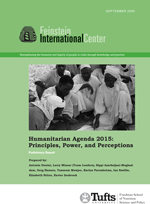This report summarizes the findings of the first phase of a major research project on the challenges and compromises that are likely to affect humanitarian action in the next decade.
The issues are organized and analyzed around four interrelated “petals”: the universality of humanitarianism, the implications of terrorism and counter-terrorism for humanitarian action, the search for coherence between humanitarian and political agendas, and the security of humanitarian personnel and the beneficiaries of humanitarian action.
Six case studies—Afghanistan, Burundi, Colombia, Liberia, northern Uganda and the Sudan—provide the basis for the analysis, conclusions and recommendations contained in this report. Additional case studies—Democratic Republic of Congo, Iraq, Nepal, Sri Lanka and the Occupied Palestinian Territories—are planned as part of phase two of the research.
The approach is evidence-based. The focus is on local perceptions. Generic and country-specific findings are distilled through an inductive process involving interviews and focus group meetings at the community level aimed at eliciting perceptions of local people on the functioning of the humanitarian enterprise. Additional data was gathered through interviews with aid community staff and an electronic survey of headquarters personnel. Readers are encouraged to make their own assessments of the field data, which is available on the web.
The findings highlight the crisis of humanitarianism in the post-9/11 world. They show that action aimed at alleviating the suffering of the world’s most vulnerable has been for the most part incorporated into a northern political and security agenda.







